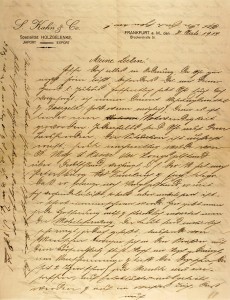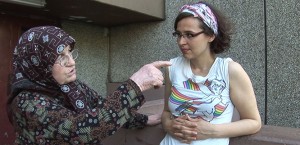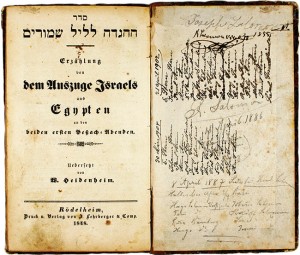A Letter from the Archive Tells of the Outbreak of War in 1914

Letter from Leo Roos to his family (first page), Frankfurt am Main, 31 July1914
Donated by Walter Roos
© Jewish Museum Berlin
“The situation is extremely serious; His Majesty the Emperor declared this afternoon that Germany is now at war.” Exactly one hundred years ago today, eighteen-year-old Leo Roos penned these lines to his parents and siblings back home in the West Palatine village of Brücken. But they were never to receive his letter, as the note on the envelope attests: Dispatch prohibited on account of the state of war. Return to sender.
Roos felt he was witnessing fateful times. He lived in Frankfurt, where he was apprenticed to a bank. He thought himself a city boy, much closer to momentous global events than his family was, off in its isolated village. He described the tense mood: → continue reading

Canan Turan with her grandmother
© Adriana Uribe
In our series of events “New German Stories” we present different perspectives on the immigration country Germany. That immigrants from Turkey, Vietnam, Poland, India and Cameroon and their descendants have stories to tell is nothing new—the novel twist is, that they present them here as German stories. On Tuesday, 8 July, director Canan Turan will be a guest of the Academy of the Jewish Museum. In her film KIYMET, she tells the story of her grandmother, who migrated to Berlin from Turkey in the early 70s. We asked Canan three questions about her project:
How did the idea to make a film about your grandmother Kıymet come about? → continue reading
A Newly Acquired Passover Haggadah and Its Previous Owners in Kreuzberg
Next week, the first Passover Seder will be celebrated on the evening of April 14. All over the world Jews will gather with their family and friends around festively decked tables and partake in the centuries-old tradition of reciting the Haggadah. Its text describes the story of the Israelites’ liberation from slavery in Ancient Egypt and sets forth the order of the evening.

“An Account of Israel’s Exodus from Egypt on the First Two Evenings of Passover,” published in Rödelheim near Frankfurt, 1848
© Jewish Museum Berlin, photo: Aubrey Pomerance
A Haggadah in an online auction recently caught my eye, and I managed to purchase it for a negligible sum for the Jewish Museum Berlin. Published in 1848 in Roedelheim near Frankfurt under the title Erzählung von dem Auszuge Israels aus Egypten an den beiden ersten Pesach-Abenden (An Account of Israel’s Exodus from Egypt on the First Two Evenings of Passover), the book contains the Hebrew version of the Haggadah text, along with its translation into German by Wolf Heidenheim. It is the twentieth edition of the Roedelheimer Haggadah that first appeared in 1822/23, there with the German translation in Hebrew characters. In 1839, the translation first appeared in Roman letters, as is the case with our new acquisition.
There is, to be sure, nothing remarkable about this edition from 1848. → continue reading


